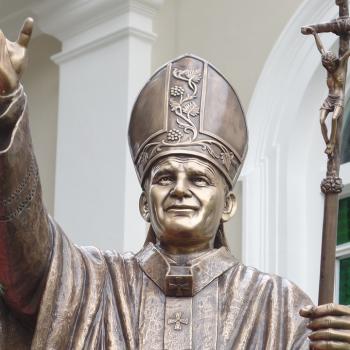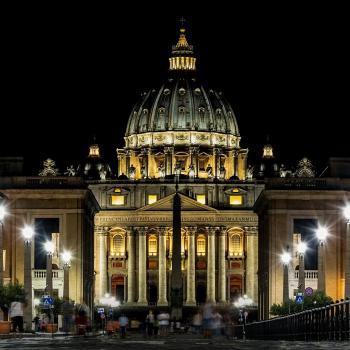
Open Theism is a view on the nature of God’s foreknowledge. One of the leading proponents/popularizers of this view, Greg Boyd, would take issue with framing the discussion in this way. He insists that Open Theism is not about the nature of God’s foreknowledge, but rather a view about the nature of creation. Be that as it may, the topic is usually brought up within the context of divine foreknowledge.
What is Open Theism
Open Theism is the view that maintains the following:
- God knows all true propositions.
- Many propositions about the future have no truth value.
- Hence God cannot know the truth value of those propositions.
- God’s inability to know something that is literally impossible to know does not imply a deficiency in God’s foreknowledge.
In this article, I will be using Gregory Boyd as the representative of Open Theism. When Boyd first advocated this view, he was met with a good deal of hostility. However, of late, this view has become more popular among evangelicals, particularly evangelicals who do not like Calvinism.
The Future Is Not Settled
To understand Boyd’s form of Open Theism you need to understand the centrality of the idea that the future is not exhaustively “settled”. By this Boyd means that not every detail of the future is pre-determined. The future is malleable, not only to us but to God as well. God does not pre-determine every detail of what will happen in the future. Rather, God knows the future as partly “settled” and partly “unsettled”. Those future events which God has chosen to settle ahead of time are settled, and those events which God has chosen to leave “open” are left unsettled.
Boyd sometimes refers to the “Choose Your Own Adventure” type storybook to illustrate how he sees the future. In these storybooks, you can jump to a different section of the book depending on how you want the ending to go. Similarly, God has all the plots written ahead of time, but you can choose which direction you want to go. Hence, while God knows all possible plots, you get to choose which one you want to follow.
Bible Doesn’t Teach The Classical View
In contrast, classical theists maintain that God knows the future down to the most minute detail. There is no future event that God does not already know with certainty. God doesn’t simply know a set of possible plots, He knows exactly what will happen. Boyd thinks that the classical view of God is the result of the early church’s acceptance of Greek philosophy, rather than the result of a thorough Biblical exegesis. He maintains that if you simply exegete the text of Scripture, you will not find a God that exhaustively knows the future.
Boyd claims that his view adheres to the classical doctrine of divine omniscience in that the classical doctrine minimally states that: God knows all truths whether they be past, present, or future. However, he claims that since the future is not entirely settled, God knows the future as partly settled and partly open.
Cash Value of Open Theism
The cash value of this view is that it leaves room for man to participate in the outcome of his future. Since the future isn’t settled, man can genuinely affect the future. On the face of it, it would seem that this provides a sense of meaningfulness. If we play a role in determining the future (for us and others), it infuses our choices with meaning and significance. When a philanthropist creates a foundation to help the mentally ill, that philanthropist can take joy in the fact that if he hadn’t started the foundation, then it might not have been created. Thus, the world is a better place, in part, due to his efforts.
If, on the other hand, the future is entirely settled then it would seem that man is left without anything to affect. All of man’s efforts are predetermined by God and cannot be altered by man. Thus the classical doctrine of God rules out free will. The reasoning goes like this:
- If God has exhaustive and infallible foreknowledge of the future, then man is not free.
- God does have exhaustive and infallible foreknowledge of the future.
- Therefore, man is not free.
Thus the open theist denies the consequent:
- If God has exhaustive and infallible foreknowledge of the future, then man is not free.
- Man is free.
- Therefore, God does not have exhaustive and infallible foreknowledge of the future.
Admittedly, people who hold to Open Theism do not argue this way. They are sensitive to the fact that Calvinists pejoratively characterize them as being ardent defenders of free will. So much so that they want to avoid arguing for Open Theism on these grounds. Rather they argue that their view is the view that best comports with the text of Scripture.
Arguments for Open Theism
Boyd’s argument for Open Theism is fairly straightforward. He maintains the following:
- Scripture does not affirm a God that knows every future event exhaustively.
- Scripture does affirm that there are things that God doesn’t know.
Furthermore, Boyd claims that as a Protestant, he is not obliged to accept a doctrine on the basis that the “church” has taught it for a long time. He maintains it is fully in keeping with the spirit of the Reformation to question claims that were made on church authority rather than on the authority of Scripture alone.
Scripture Doesn’t Say God Knows the Future Exhaustively
Let’s take each one of the above claims individually.
1. Scripture does not affirm a God that knows every future event exhaustively.
Boyd argues that Scripture contains two motifs about God’s foreknowledge. There is a motif of future determinism and a motif of future openness. He claims that the classical theist only takes the motif of future determinism seriously.
Motif of Future Determinism
Isaiah 46:9-10
I am God, and there is no other; I am god, and there is no one like me, declaring the end from the beginning and from ancient times things not yet done.
Boyd’s Interpretation: “The Lord’s ability to declare from ancient times thing not yet done is demonstrated throughout Scripture… These passages exalt God as the sovereign Lord of history. This scriptural motif reassures believers that however out of control the world may seem, the Lord is steering history toward his desired end.”
Boyd emphasizes that the passage doesn’t speak of God’s knowing the end from the beginning, but “declaring” the end from the beginning. In fact, in verse 11 of chapter 46, God says “I have spoken, and I will bring it to pass”. Thus these passages are talking about God’s sovereign providential control over all events, even though God doesn’t determine every single action that occurs. He determines what he wants to determine ahead of time and He leaves open what he wants to leave open.
Genesis 15:13
Then the LORD said to Abram, “Know for certain that your offspring will be sojourners in a land that is not theirs and will be servants there, and they will be afflicted for four hundred years.
Boyd’s Interpretation: “This is a spectacular demonstration of the Lord’s sovereign control of the future. But is it evidence that the future is exhaustively settled? Not at all. It only implies that some of the future is settled. People tend to assume that if some of the future is settled, all of it must be settled.”
Here again, Boyd sees this passage as one declaring the sovereignty of God rather than a proof text for the exhaustive foreknowledge of God.
Matthew 26:34
Jesus said to him, “Truly, I tell you, this very night, before the rooster crows, you will deny me three times.”
Boyd’s Interpretation: “Future actions might also be settled not only because the Lord has decided them beforehand, but also because a person’s character settles them. As we all know, the character becomes more predictable over time. The longer we persist in a chosen path, the more that path becomes part of who we are… our omniscient Creator can predict our behavior far more extensively than we could predict it ourselves because he knows us far better than we know ourselves.”
Generally speaking, Boyd will take passages that seem to imply that God knows the future exhaustively in the following way: The passage speaks of a particular future event that will happen because He either causes it directly or can predict it, not because God exhaustively knows what will happen.
Thus, for Boyd, scriptures testify to a God that knows specific things about the future, but never does it outright say that God knows every detail of what will happen in the future. Boyd further claims that the OT view better accounts for the above scriptures AND it accounts for the motif of future openness.
2. Scripture does affirm that there are things that God doesn’t know.
Motif of Future Openness
While there are passages that appear to show that God knows the future exhaustively, there are passages that explicitly declare that God doesn’t know everything, that He makes mistakes, and that He regrets decisions that he makes.
Genesis 6:6 (Boyd: God regrets a decision that He made)
And the LORD regretted that he had made man on the earth, and it grieved him to his heart.
1 Samuel 15:11 (Boyd: God regrets making Saul king of Israel)
I regret that I have made Saul king, for he has turned back from following me and has not performed my commandments.
Numbers 14:11 (Boyd: God doesn’t know how long the people will persist in unbelief)
How long will this people despise me? And how long will they not believe in me, in spite of all the signs that I have done among them?
Numbers 14:12 – 20 (Boyd: God changes His mind)
God tells Moses that he is going to strike the Israelites with pestilence and disinherit them. Moses intercedes and God relents. He tells Moses “I have pardoned, according to your word.”
Jeremiah 3:6-7 (Boyd: God thought something would happen and then it didn’t happen)
The LORD said to me in the days of King Josiah: “Have you seen what she did, that faithless one, Israel, how she went up on every high hill and under every green tree, and there played the whore? And I thought, ‘After she has done all this she will return to me,’ but she did not return, and her treacherous sister Judah saw it.
On the face of it, these passages seem to say that there are things that God doesn’t know. Additionally, it seems that Boyd’s schema for understanding the “whole of Scripture” is superior to the classical theist in that it accounts for more Scriptural texts and it does so in a more “plain” and “literal” way. He contends that the classical theist must resort to ad hoc readings of the text due to their prior commitment to God as pure actuality.
Given this approach to Scripture, Boyd asks his readers to consider whether or not the God of classical theism lines up with Scripture. If God really does have exhaustive knowledge of the future, then why does God regret doing something? Why does He ask questions about the future? Why does He frustrate Himself by intending something that He knows will not come about? Why does God portray Himself as being surprised by various outcomes? Thus, according to Boyd, the God of classical theism is not the God of Scripture.
Philosophical Arguments
The types of philosophical arguments for Open Theism are as follows:
- The notion of God held by classical theists is incoherent on several counts
- If God has exhaustive and infallible knowledge of the future, then creatures do not have free will
- Libertarian free will is true
- There is nothing problematic (either theologically or philosophically) with maintaining that God does not know the future exhaustively
Evaluation
There are several approaches to critiquing Open Theism.
- You can respond to Boyd’s exegesis of the passages in question
- You can show that his views have not been accepted by the church
- You can criticize his hermeneutical and philosophical assumptions
Since I agree with Boyd that you can’t conclusively establish that God knows the future exhaustively from Scripture alone, I would not take route 1. Since I am Protestant and I am not sure how one would effectively refute Boyd on this point as a Protestant, I won’t take route 2. I think it is most fruitful to criticize him on philosophical grounds and some methodological grounds.
Exegesis and Philosophy
Boyd writes “exegesis should always drive our philosophy, instead of the other way around”. He doesn’t want to end up adopting the god of the philosophers, rather he wants to know the God of the Hebrew Scriptures. However, in a valiant attempt to place Scripture above philosophy, Boyd instead naively assumes certain views about God and about biblical interpretation that ought to be evaluated philosophically. Unfortunately, his approach does not lead to placing Scripture above philosophy, rather it ends up confusing Biblical interpretation and with philosophy so that both are done poorly.
Extra-Biblical Analysis is Unavoidable
On the face of it, Boyd’s approach sounds like a reasonable and pious one. However, bringing philosophical presuppositions to the text of Scripture is unavoidable. Even one’s method of interpretation is properly evaluated by philosophy and or by the methods of historical research. When should we take a passage literally? Should we take a given statement as the teaching focus of a given section of scripture? Do the words that I am reading convey objective meaning or is bringing meaning to the text unavoidable? None of these questions are answered within the text of Scripture.
In the case of Open Theism, Boyd presupposes that we should read the texts speaking about God as forgetting/regretting literally. Not only should we read them literally, but we should take their meaning to be univocal. In other words, when the text says that “God regretted”, we should take that to mean the same thing as when we say that “John regretted”. But there are good prima facie reasons for not taking the text in this way.
Consider the fact that when Tolkien writes about Frodo Baggins being afraid, we take Frodo’s fear to be the same kind of emotive state that we would have because in Tolkien’s cosmology hobbits are very similar to us. They are finite beings, with an intelligence and disposition that is very similar to us. They might be smaller and a bit more simple-minded but in the grand scheme of things they are persons in the same way that we are persons.
However, when we read a story about an ant that is sad because he wants to go live in a big city, we automatically take this as an anthropomorphism. And we don’t do this simply because of the genre of the text we are reading. Lord of the Rings and a children’s story about ants are both works of fiction and could conceivably both be in the fantasy genre. No matter the genre, we automatically decide whether a text should be taken anthropomorphically or not based on our knowledge of the subject about which we are speaking. We automatically read the ant story as an anthropomorphism because we know that ants don’t daydream about going to the theater or about becoming famous. No matter what we are reading, we take the meaning of a given text in light of our knowledge about the subject in question.
Knowledge of Reality Informs Our Interpretations
If the differences between God and man are greater than the differences between an ant and a man, then on this concession alone we ought to be wary of saying “The Bible says God regretted, so that means he has the ability to regret just like we do”. Boyd would confess that God is not just a really powerful human being. He knows that God is a being of a different order.
However, I am not clear about why he thinks the correct approach is to assume that God’s “regretting” is what we typically think of when we think of “regretting”. I have not seen a discussion by him defending univocal God talk. I fail to see why he thinks it is sufficient to cite a passage like Numbers 14:11 “How long will this person despise me?” and summarily conclude that the passage teaches that God didn’t know how long His people would despise him.
At least in his book “God of the Possible” and in the four views book “Divine Foreknowledge: Four Views” Boyd spends a small amount of time, almost in passing, saying that the classical view is the result of Greek philosophy, but he doesn’t refute the classical doctrine of God head-on. Rather he summarily dismisses the view because it isn’t derived from Scripture. Again, I don’t know why thinks this is sufficient.
Views Informed By Philosophy are Not Automatically False
A view is not false for being philosophical. Nor is it false for being derived from philosophy. Views about God that are stated philosophically or based on philosophy are not automatically false in virtue of being philosophical or derived from philosophy. Boyd needs to make the case for this. Moreover, despite Boyd’s protests, his position is a philosophical one as well.
As David Hunt writes,
“It is a plausible principle that if p is a philosophical position, then the denial of p is also a philosophical position… if it is a philosophical position that God cannot change, then the denial of that position – the claim that God can change – is likewise philosophical.”
Boyd thinks that classical theists see the “motif of future determinism” as really describing God, but they take the “motif of future openness” as a set of anthropomorphic statements that don’t really describe God. This sort of criticism is only interesting if classical theism is refuted on it’s own grounds. Why must all texts that speak of God be literally / univocally true of God in order for them to communicate something meaningful and profound to us?
Some of the most beautiful and meaningful literature we have is poetry. Poetry uses anthropomorphisms and other literary tools to communicate something profound even if it isn’t literal. Given that two thirds of the Old Testament is a written in some form of Hebrew poetry, it is not out of line to think that claims about God are stated poetically.
In short, Boyd’s summary dismissal of classical theism is a targeted application of his principle: exegesis should always drive our philosophy, instead of the other way around. However, since Scripture does not explicitly teach that the future is partly open, Boyd also uses philosophy to fill in gaps in our knowledge. Classical theist area aware of the fact that they do this. Boyd doesn’t seem to think that he is relying on philosophy to come to his theological conclusions, but the strikes me as false.












